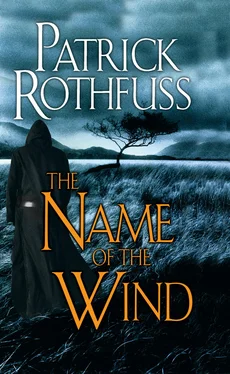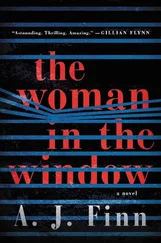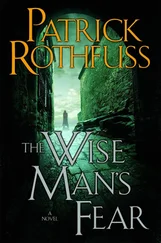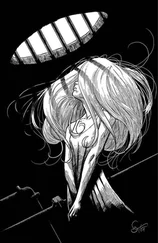The boy’s eyes grew wide. “He was a sweet-eater?”
Cob nodded. “And even worse, the fellow was starting to sweat like a hard-run horse, his eyes were wild, and his hands . . .” Cob widened his own eyes and held out his hands, making them tremble. “So Kvothe knew the fellow had the hunger something fierce, and that meant he’d stab his own mum for a bent penny.” Cob took another long drink, drawing out the tension.
“Whatever did he do?” Bast burst out anxiously from the far end of the bar, wringing his hands dramatically. The innkeeper glared at his student.
Cob continued, “Well, first he hesitates, and the man comes closer with the knife and Kvothe can see the fellow ain’t going to ask again. So Kvothe uses a dark magic that he found locked away in a secret book in the University. He speaks three terrible, secret words and calls up a demon—”
“A demon?” the prentice’s voice was almost a yelp. “Was it like the one . . .”
Cob shook his head, slowly. “Oh no, this one weren’t spiderly at all. It was worse. This one was made all of shadows, and when it landed on the fellow it bit him on the chest, right over his heart, and it drank all the blood out of him like you’d suck the juice out of a plum.”
“Blackened hands, Cob,” Carter said, his voice thick with reproach. “You’re going to give the boy nightmares. He’ll be carrying around that damn iron stick for a year with all your nonsense stuffed in his head.”
“That’s not how I heard it,” Graham said slowly. “I heard there was a woman trapped in a burning house, and Kvothe called up a demon to protect him from the fire. Then he ran inside and pulled the lady out of the fire and she wasn’t burned at all.”
“Listen to yourselves,” Jake said, disgusted. “You’re like kids at Midwinter. ‘Demons stole my doll.’ ‘Demons spilled the milk.’ Kvothe didn’t meddle with demons. He was at the University learning all manner of names, right? The fellow came at him with a knife and he called out fire and lightning, just like Taborlin the Great.”
“It was a demon, Jake,” Cob said angrily. “Otherwise the story don’t make a lick of sense. It was a demon he called up, and it drank up the fellow’s blood, and everyone who saw was powerful shook up by it. Someone told a priest, then the priests went to the constable, and the constable went and pulled him out of the widow’s inn that night. Then they slapped him into jail for consorting with dark forces and such.”
“Folk probably just saw the fire and thought it was a demon,” Jake persisted. “You know how folk are.”
“No I don’t, Jacob,” Cob snapped, crossing his arms in front of his chest and leaning back against the bar. “Why don’t you tell me how folk are? Why don’t you just go ahead and tell this whole damn story while . . .”
Cob stopped at the sound of heavy boots clumping on the wooden landing outside. After a pause, someone fumbled with the latch.
Everyone turned around to look at the door, curious, as all the regular customers were already there. “Two new faces in one day,” Graham said gently, knowing he was touching on a delicate subject. “Looks like your dry spell might be over, Kote.”
“Roads must be getting better,” Shep said into his drink, a hint of relief in his voice. “About time we got a touch of luck.”
The latch clicked and the door swung slowly open, moving in a slow arc until it struck the wall. A man stood outside in the dark, as if deciding whether or not to come in.
“Welcome to the Waystone,” the innkeeper called out from behind the bar. “What can we do for you?”
The man stepped into the light and the farmers’ excitement was smothered by the sight of the piecemeal leather armor and heavy sword that marked a mercenary. A lone mercenary was never reassuring, even in the best of times. Everyone knew that the difference between an unemployed mercenary and a highwayman was mostly one of timing.
What’s more, it was obvious this mercenary had fallen on hard times. Brownburr clung thick to the bottoms of his pants and the rough leather of his boot’s laces. His shirt was fine linen dyed a deep, royal blue, but mud-spattered and bramble-torn. His hair was a greasy snarl. His eyes were dark and sunken, as if he hadn’t slept in days. He moved a few steps farther into the inn, leaving the door open behind him.
“Looks like you’ve been on the road a while,” Kvothe said cheerily. “Would you like a drink or some dinner?” When the mercenary made no reply, he added, “None of us would blame you if you wanted to catch a bit of sleep first, either. It looks like you’ve had a rough couple days.” Kvothe glanced at Bast, who slid off his stool and went to close the inn’s front door.
After slowly looking over everyone sitting at the bar, the mercenary moved to the empty space between Chronicler and Old Cob. Kvothe gave his best innkeeper’s smile as the mercenary leaned heavily against the bar and mumbled something.
Across the room, Bast froze with his hand on the door handle.
“Beg your pardon?” Kvothe asked, leaning forward.
The mercenary looked up, his eyes meeting Kvothe’s then sweeping back and forth behind the bar. His eyes moved sluggishly, as if he had been addled by a blow to the head. “ Aethin tseh cthystoi scthaiven vei. ”
Kvothe leaned forward, “I’m sorry, what was that again?” When nothing was forthcoming from the mercenary, he looked around at the other men at the bar. “Did anyone catch that?”
Chronicler was looking the mercenary over, eyeing the man’s armor, the empty quiver of arrows, his fine blue linen shirt. The scribe’s stare was intense, but the mercenary didn’t seem to notice.
“It’s Siaru,” Cob said knowingly. “Funny. He don’t look like a shim.”
Shep laughed, shaking his head. “Naw. He’s drunk. My uncle used to talk like that.” He nudged Graham with an elbow. “You remember my Uncle Tam? God, I’ve never known a man who drank like that.”
Bast made a frantic, covert gesture from where he stood near the door, but Kvothe was busy trying to catch the mercenary’s eye. “Speak Aturan?” Kvothe asked slowly. “What do you want?”
The mercenary’s eyes rested momentarily on the innkeeper. “ Avoi —” he began, then closed his eyes and tilted his head, as if listening. He opened his eyes again. “ I . . . want . . . ” he began, his voice slow and thick. “ I . . . look . . . ” He trailed off, his gaze wandering aimlessly around the room, his eyes unfocused.
“I know him,” Chronicler said.
Everyone turned to look at the scribe. “What?” Shep asked.
Chronicler’s expression was angry. “This fellow and four of his friends robbed me about five days ago. I didn’t recognize him at first. He was cleanshaven then, but it’s him.”
Behind the man’s back, Bast made a more urgent gesture, trying to catch his masters attention, but Kvothe was intent on the befuddled man. “Are you sure?”
Chronicler gave a hard, humorless laugh. “He’s wearing my shirt. Ruined it too. Cost me a whole talent. I never even got a chance to wear it.”
“Was he like this before?”
Chronicler shook his head. “Not at all. He was almost genteel as highwaymen go. I had him pegged as a low-ranking officer before he deserted.”
Bast gave up signaling. “Reshi!” He called out, a hint of desperation in his voice.
“Just a moment, Bast,” Kvothe said as he tried to catch the stupefied mercenary’s attention. He waved a hand in front of the man’s face, snapped his fingers. “Hello?”
The man’s eyes followed Kvothe’s moving hand, but seemed oblivious to everything being said around him. “ I . . . am . . . look . . . ” he said slowly. “ I look— ”
Читать дальше











